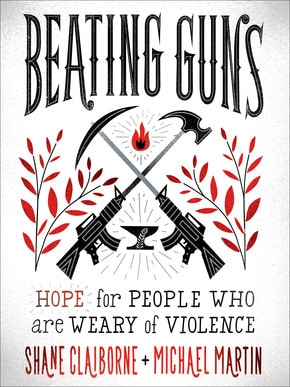
It’s been said that you can count the number of seeds in an apple but you can’t count the number of apples in a seed. We live in a world of abundant life, where one apple can produce hundreds of offspring. But the same may be true of bullets—they do not kill just one person. A bullet can destroy an entire family, community, or neighborhood. A bullet can produce many more bullets as the spiral of violence escalates, as conflict begets conflict, as wars beget wars, as hatred produces more hatred. And any time a person is killed, the person who did the killing can feel something in them die as well.
We were not made to kill, and when we do, something in us dies. We were made to love and be loved, to cultivate life, not death. So we need to discover how to live on the side of life again. Death, as we will see, is one of the first things that came after the fall of Adam and Eve way back in the garden of Eden.
A bullet can destroy an entire family, community, or neighborhood. A bullet can produce many more bullets as the spiral of violence escalates.
The call to turn swords into plows is as much about transforming our way of life as it is about transforming a gun into a garden tool.
The hard thing about transforming a life, like transforming metal, is that it requires work, sweat, heat, and constant attention. There’s a beautiful Scripture that says, “Continue to work out your salvation with fear and trembling” (Philippians 2:12). Salvation is a movement, not just a moment. Transformation is a process. This is the paradox of waiting for the steel to reheat. You know that transformation is coming, even though it may feel like you are taking a pounding, but you are also thankful for the rest that you are given while you reheat in the fire. And then as you are being healed, you become a healing presence in this broken world.
Communities take time to transform. One of our mentors is Dr. John Perkins, who’s almost ninety years old. At one point, I (Shane) was explaining to him that I was growing impatient because our neighborhood was not changing as quickly as I wished it would. We had been working tirelessly for almost five years, and folks were still getting shot on our corners and overdosing on our sidewalks. Dr. Perkins said, “Be patient, my brother. You will see things begin to change and transform, but it may take another ten years.”
Sometimes we are tempted to turn up the heat on the forge to make things move a little faster. But that only means we run the risk of burning off the metal from too much heat. God’s grace moves slow and steady. We live in a world that wants everything to happen in an instant: fast food, quick money from the ATM, movies on demand, news at our fingertips. But the stuff that really gives life takes time. A baby takes nine months. A good meal doesn’t come in three minutes. It takes time to learn a new skill or language. And lives that are beautiful take time to produce, just like any work of art. You begin to wonder if guns are our default because they seem like a quick and easy answer in the short term. They give us access to immediate power and force. But violence is often the instrument of those who are impatient, those who lack imagination, those who cannot wait on justice or freedom or redemption.
Turning swords into plows reorients how we do life. We move from instant gratification to seasonal patience.
The fact that something can be made new is a miracle. Caterpillars to butterflies, weapons to tools, sinners to saints. The old is gone, the new has come. Nothing is beyond redemption. In Philadelphia, we’ve turned old tires, televisions, and computer monitors into garden planters. We’ve made sunflowers out of hubcaps and turned one ugly wall after another into a piece of art. Transformation is magical. When we turn guns into garden tools, we turn fear into feasts. When we no longer train to annihilate fear, we train to face it. When we don’t train for war, we train for transformation. When we begin to turn our swords into plows, we experience a paradox of vulnerability and opportunity.
When we turn guns into garden tools…we no longer train to annihilate fear, we train to face it.
One of the profound things about making a garden tool is that it is hard to do alone. Many of the important steps require two sets of hands. When you punch a hole for the handle, you need at least three or four hands—one for the hammer, one for the punch, and one or two to hold the tongs with the heated metal. This process can’t happen alone. Another lesson from the forge: we are not meant to do life alone. Jesus sent the disciples out in pairs and elsewhere promised that “where two or three gather,” he would be with us (Matthew 18:20). We are created in the image of God, who reflects community to us— Father, Son, Spirit. We are made to do life together.
If you want to be a help in your community, you need to allow your community to speak into your life, and you need to be vulnerable to those around you. As iron sharpens iron, so we sharpen one another (Proverbs 27:17).
 Shane Claiborne is an author, activist, speaker, and self-proclaimed “recovering sinner.” He writes and speaks about peacemaking, social justice, and Jesus, and is the author or coauthor of numerous books, including Beating Guns: Hope for People Who Are Weary of Violence, from which this excerpt is taken with permission.
Shane Claiborne is an author, activist, speaker, and self-proclaimed “recovering sinner.” He writes and speaks about peacemaking, social justice, and Jesus, and is the author or coauthor of numerous books, including Beating Guns: Hope for People Who Are Weary of Violence, from which this excerpt is taken with permission.
 Michael Martin is a Mennonite pastor turned blacksmith and the founder and executive director of RAWtools Inc. RAWtools turns guns into garden tools (and other lovely things), resourcing communities with nonviolent confrontation skills in an effort to turn stories of violence into stories of creation.
Michael Martin is a Mennonite pastor turned blacksmith and the founder and executive director of RAWtools Inc. RAWtools turns guns into garden tools (and other lovely things), resourcing communities with nonviolent confrontation skills in an effort to turn stories of violence into stories of creation.


